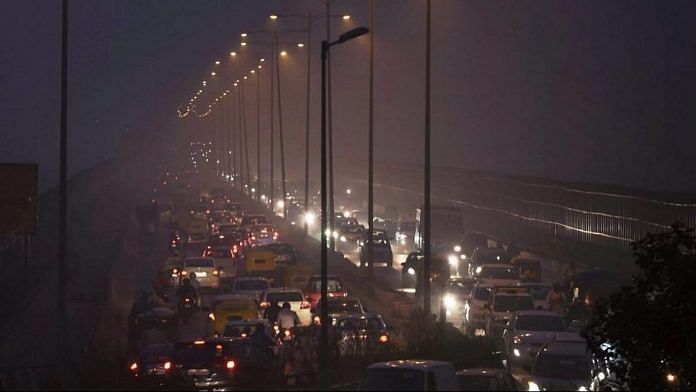There is no clarity on where the government will keep the impounded vehicles or what it will do with them.
Thirty eight lakh vehicles. That’s approximately the number of vehicles the government will have to impound in Delhi-National Capital Region to implement the Supreme Court’s order to fix the city’s air pollution.
But the city just does not have the wherewithal to impound these 10-year-old diesel and 15-year-old petrol vehicles plying on the roads. There is no clarity on where the government will keep the impounded vehicles or what it will do with them.
The Supreme Court’s decision is likely to open a Pandora’s box in the absence of a regulatory ecosystem to scrap old vehicles, say transport sector experts. And it’s the Centre, more specifically the union road transport and highways ministry, that is to be blamed for failing to firm up the scrapping policy till now.
Also read: How to choose the right pollution mask that will help you survive Delhi’s toxic air
The policy was conceptualised with an eye to address vehicular pollution in our cities. Earlier this year, consultancy firm AT Kearney did an analysis for the union road transport ministry, which said that 15-20 per cent vehicular pollution in India was caused by some seven lakh commercial vehicles that were manufactured before 31 December 2000.
Govt’s indecisiveness could prove costly
In the absence of a framework for scrapping old vehicles, the government’s problem will further aggravate if the apex court decides to prohibit plying of old diesel and petrol vehicles in other million-plus cities too where the air quality is equally bad.
The environment advocacy group, Centre for Science and Environment, had also released a report earlier this year that said about 20 million commercial vehicles, which are at least 20 year-old, have accumulated in India by 2015 and require scrapping.
Status of vehicle scrapping policy
The concept was first mooted in 2015 by union road transport minister Nitin Gadkari. At that time, it was called the Voluntary Vehicle Modernisation Policy. It proposed incentive to owners in the form of reduced excise duty on vehicles bought before 31 March 2015, if they scrapped their old car that was over 11 year-old.
Since then, the policy has gone through many twists and turns and several rounds of consultations with different ministries including finance and steel. The latest version of the policy proposes a mandatory cap of 20 years on the life of all commercial vehicles from 2020.
Also read: Delhi’s pollution crisis needs a political solution, not the Supreme Court
Currently, the union road transport and highways ministry is consulting states for their feedback on the policy following directions from Prime Minister Narendra Modi’s office. The ministry had finalised the policy earlier this year and sent it to the Prime Minister’s Office for approval but the latter returned the cabinet note with a slew of directions. Among other things, the PMO wants the ministry to start the scheme on a voluntary basis.
Illegal scrapping industry will mushroom
In the absence of a regulatory framework, scrapping of end-of-life vehicles thrives informally, like in the flourishing Mayapuri car scrap market in the Capital. Not only are they unorganised but operate in environmentally hazardous condition.
While the government’s official line is that the policy needs more work, one of the reasons for going slow could be that it does not want to take a decision that could prove politically inexpedient in an election year. After all, lakhs of owners across the city are at a risk of losing their old vehicles. Also, the government is in no mood to give incentive from its pocket to encourage owners to get their old vehicles scrapped, as proposed by the road ministry. The PMO wants the manufacturers to step in but the latter is not keen.
But time is running out for all the stakeholders involved to reach a consensus. Any further delay could end up further endangering the lives of city residents, who are forced to brave the polluted air day in and day out.
Also read: Instead of firecrackers, SC should focus on increasing Delhi’s bus fleet




Poorly written. The author seems has very little knowledge of issues at hand. The Govt must seriously challenge the SC order because SC does not have any authority to order wholesale condemnation of vehicles 10/15 years old without following due process of law. So long as the vehicle meets emission norms, no action should be taken. SC order is an invention of arbitrary rule in direct violation of existing law. So long as vehicles were manufactured as per existing law and same were meeting fitness/pollution standards, vehicles cannot be condemned. What about the life time road tax paid? Will the SC arrange for refund? Who will provide the funds to replace the cars? So many serious issues that need discussion, but the owner is interested in cricket!!!